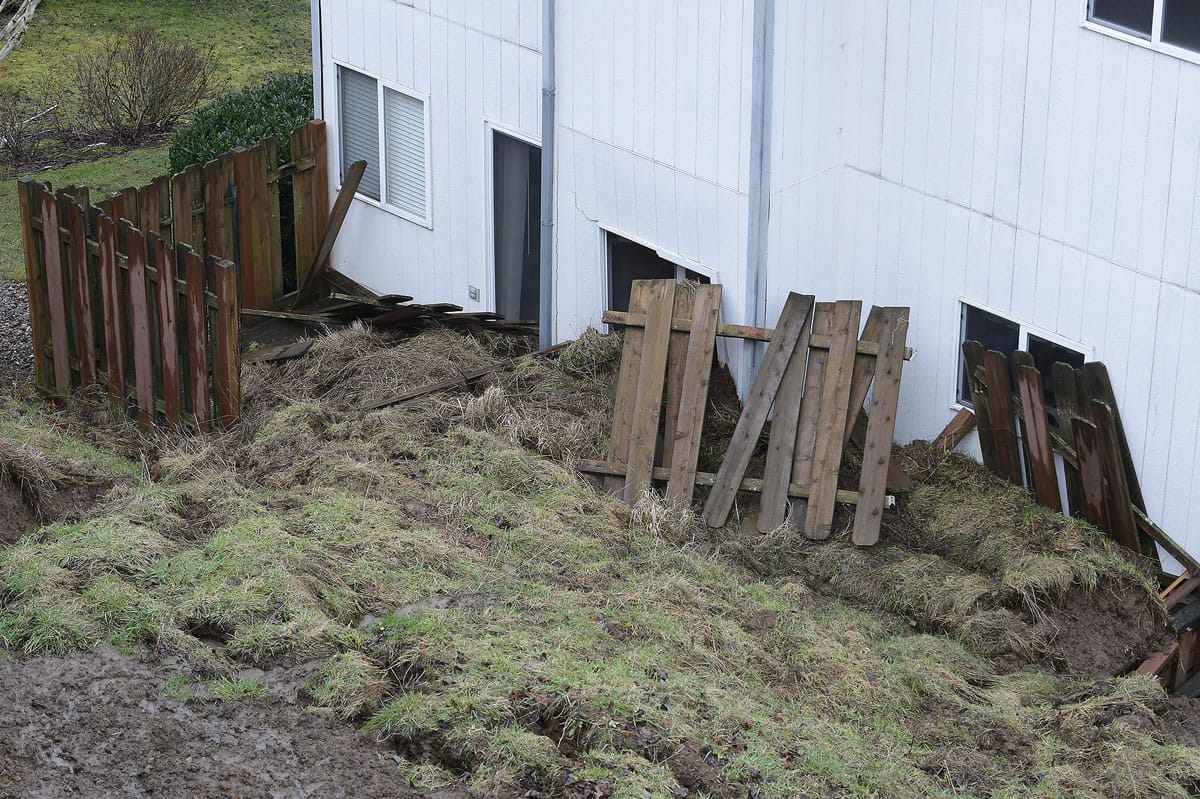After a landslide rolled through John Trost’s back fence, the Camas homeowner had to deal with several cubic yards of soggy soil slumped up against his house.
Other aspects of Sunday’s hillside slump are just about as muddy. Why did that section of slope above Trost’s backyard cut loose? Who will pay for the damage?
What do you do with all that dirt? Will it happen again? Can Trost and his Prune Hill Park neighbors take preventive steps? And who will pay for that?
Nobody seems to know for sure.
For now, “we’re trying to deal with the immediate situation — get the dirt off the house,” Trost said Wednesday afternoon.
Conversations involving those critical questions have started, at least.
o Your standard homeowner’s policy will not cover damage caused by a landslide. Separate earth-movement insurance (including landslides) can be purchased that will cover structural damage.
SOURCE: Washington State Office of the Insurance Commissioner
o On the Web: Information on landslide insurance is available at this website.
“Officially, insurance is in the assessment stage,” Trost said. He included the word “officially” because his homeowner’s policy doesn’t include landslide coverage. But so many aspects of this event are still being sorted out.
“I spoke to neighbors three times today. Things are in the works to have discussions with the city,” Trost said. “Let’s get all the people in a room and talk about a good long-term solution.”
Neighbors Tom and Barbara Cooper are looking forward to that.
“Our concern is how are things going to proceed,” Tom Cooper said. The Coopers own a house at the top of the slope, just to the east of the property where the slide originated.
“We would like to be close to the process: how it will be resolved, the engineering, and all that will go into fixing this situation,” Cooper said Thursday. “Will it impact our slopes?
“There are a multitude of questions here. It would be great if this would shed some light on it, identify the level of risk,” Cooper said. “Maybe we’re sitting here on eggshells and don’t know it.”
The city, meanwhile, is bringing some expertise on board.
“We hired a geotechnical engineer to assess the problem, look at adjacent properties, help people, and if there is additional risk, how to mitigate for that,” Pete Capell, Camas city administrator, said.
If it sounds like all parties are starting from scratch on this, that’s because agencies and local jurisdictions don’t have response plans for landslides within a private housing development.
“It’s all private property,” Capell said. “It’s not our responsibility, but we’re trying be a good neighbor and understand what the nature of the problem is.”
Some of the world’s leading geologists work in Vancouver as part of the U.S. Geological Survey, but they don’t deal with neighborhood events. By the same standard, the U.S. Forest Service is not a player when a backyard fir tree topples onto someone’s roof.
Geological Survey hydrologist Carolyn Driedger did see images of the slide in news coverage. The homesite didn’t look like a natural landscape, she said.
“It looked like the whole thing has been bulldozed into place” to make a bigger backyard, said Driedger, outreach coordinator at Cascades Volcano Observatory in east Vancouver.
A building official will go through the files to research the paperwork and permits associated with the 1999 development, Capell said.
“Without some research, we don’t know what the requirement of the day was,” Capell said. He has heard that the developer is no longer in business.
“Unfortunately, two properties are impacted,” Capell added. In addition to Trost’s home, “we will have people assessing the uphill property.”
The homeowner at the top of the slope lost some of the soil under a post that supports the rear deck.
“The support for the deck is scary,” Capell said.
The state’s Department of Natural Resources has compiled a map showing potential landslide areas in Clark County. It only includes major hazards, and like maps of other counties, it doesn’t represent all the at-risk terrain in Washington.
“It’s a characteristic of the land here. It slides,” said Bob Redling, spokesman for the state Department of Natural Resources. “We have problems all over the state.”
However, “we can’t respond to an individual land-owner’s request,” he said. “The DNR does investigate when there is a major landslide threat to life, property and public resources, and when cities or counties or other authorities ask.”
The Washington Administrative Code and county and city codes address landslide hazards during the permitting process. Once a house has been built, it can be a buyer-beware situation, said Battle Ground geologist Richard Kent.
Kent, who operates GeoPro Geologic Services, said that a typical homeowner can be priced out of precautionary measures.
“Commercial and industrial developers can afford large (geotechnical) investigations. Can a resident afford it? No. Landslide insurance? It’s extremely expensive, and most people don’t (buy it),” Kent said.
The NW Insurance Council actually has the numbers on coverage, although it has a different opinion about high costs.
“There are 2.3 million one-family homes in Washington,” said Karl Newman, president of the nonprofit council. “Fewer than 4,500” have policies that would cover landslides.
For typical homeowners, the extra coverage would be a $1,000 addition to a premium of about $595 a year.
“We don’t sell insurance; we’re an educational organization,” Newman said. “A point we make is that for most of us, our home is our most valuable asset.”
As his own insurance issues play out, Trost said he’s getting an education. One of the things he’s learned, Trost said, is that ” ‘natural water’ lands on God’s green earth.”
” ‘Unnatural water’ is intercepted by a man-made device and is redirected,” Trost said. “If unnatural water can be established as a primary cause of earth movement, it becomes more complex.
“It’s a big long hill,” Trost noted. “It’s odd to me that that section slid when rain falls on whole hill.”




